Important Points To Remember For Studying Horoscope by Mohan Srinivasan
Article by Mohan Srinivasan
- All Planets move from one Rasi to the other in clockwise direction and Rahu and Kethu always move in anti-clockwise direction.
- THE ORDER OF STRENGTH OF THE PLANETS
a) Rahu and Kethu – Strongest
b) Surya
c) Chandra
d) Sukra
e) Guru
f) Sani
g) Kuja
h) Budha — Weakest
3. THE ORDER OF POSITIONAL STRENGTH OF THE PLANETS
a) Exaltation Sign (UCHA STHANA) — Strongest
b) Moola Thrikona Sign
c) Own Sign (SWASTHANA)
d) Friendly Sign (MITHRU STHAN)
e) Neutral Sign
f) Enimical Sign (SATRUSTHANA)
g) Debilitation Sign (NEECHASTHANA)-Weakest
4. COMBUSTION OF PLANET (ASTANGATHA)
If a planet and Sun are in the same quarter of a Star, then that Planet is said to be in Combustion. A combust planet is capable to produce common type of results. It is true that a combust planet is week. But it is not true that its effects become nil.
Venus and Mercury have no Astanga Dosha.
- PLANETORY WAR (GRAHA YUDHHA)
Except Sun, if any planet is in association with MARS (KUJA) then that plane is said to be in planetary war.
- DEFEATED PLANET
When a planet is in association with an enemy planet and its degrees are less than that of enemy planet then that planet is said to be a defeated planet.
- WINNING PLANET
When a planet is in association with an enemy planet and its degrees are more than that of enemy planet, then that planet is said to be a winning planet.
- RETROGRESSION OF PLANETS (VAKRATHWA)
Generally all planets move from one Rasi to the other Rasi in clockwise direction and Rahu and Kethu moving in anti-clockwise direction. Some times we see that a planet, instead of moving in clockwise direction in the Zodiac seems to be moving in anti-clockwise direction. Whenever a planet is moving in anti-clockwise direction in the Zodiac, it is said to be in retrogression.
Sun and moon will never Retrograde
Rahu and Kethu are always in Retrogression.
- RETRO-DIRECT MOTION
Whenever a planet assumes retrograde motion in a Zodiacal sign, continue to move in anti-clockwise motion in that particular sign for some time, stops its anti- clockwise motion and returns to its original position with clockwise motion. Till the planet returns to the exact longitude in degrees, minutes, seconds where from it became retrograde, it is said to be retro-direct motion. It is only after it moves clockwise from the exact location of retrogression that is said to be in direct motion.
- STATIONARY PLANETS (STAMBANA)
The planets seem to remain stationary for some time after being in motion. This planetary condition is known as STAMBANA.
- Generally the signs are counted clockwise from Mesha to Meena, in Rasi chart used in Tamilnadu. The signs are counted anti-clockwise from Mesha to Meena in Rasi Chart used in Andhra Pradesh and North India.
- Rahu and Kethu will be moving always 180 deg opposite from each other in the Zodiac. Mercury is always moving either in the same sign or 12th sign or 2nd sign from Sun. It will never move away more than one sign either in the rear or in the front side from Sun. Venus will be always moving between 1st, 2nd, 3rd, 11th or 12th sign from Sun. It will never move away more than two signs either in the rear or in the front side from Sun.
(A) is occupying the Rasi owned by the planet (B) and the planet (B) occupies the Rasi owned by the planet (A). This phenomenon is called planetary exchange or Parivarthana Yoga in astrology. For example: When Mars is located in Venus’s house VRISHABHA and Venus is located in Mars’s house VRICHIKA, it is understood that the planet Mars and Venus are involved in Planetary exchange. This yoga is given more importance in Nadi astrology, because unexpected events take place due this Parivarthana yoga.
DI RULES
Weak planets: The planets are said to be weak, if
a) The planet is in debilitation
b) The plane is defeated
c) The planet is in enemies house
d) The planet is in between two enemy planets
e) The planet is in association with Rahu and Kethu
f) The planet is in Combustion
g) The planet is in association with enemy planets
h) The planet is aspected by enemy planets.
STRONG PLANETS
The planets are said to be strong if
a) The planet is in exaltation
b) The planet is winning
c) The planet is in friendly house
d) The planet is in between two friendly planets
e) The planet is in own sign
f) The planet is in association with friendly planets
g) The planet is aspected by friendly planets
3. A planet will always give Karakatva results of the conjoining (or) aspecting planets.
4. Irrespective of the Sign in which a planet is located it will give beneficial results if friendly planets are aspecting the considered planet from the following places.
1 – 5 – 9 (Same direction) from considered planet
3 – 7 – 11 (Opposite direction) from considered planet
2 – 12 (front and rear) from considered planet
It will give bad results if enemy planets are aspecting the considered planet from the above places.
5. If a planet is not conjoined with or aspected by any other planet (the above aspects) it will give the Karakatva results of Rasi (Lord) in which it is placed.
6. Even though a planet is not conjoined with or aspected by any other planet, it will give beneficial results, if it is involved in planetary exchange with friendly planet and conjoins the friendly planet or getting the aspect of friendly planet after exchanging the house. It will give bad results if it is involved in planetary exchange with enemy planet and conjoins the enemy planet or getting the aspect of enemy planet after exchanging the house.
7. Whenever a planet is located in the same star pada in which Sun is located, it is said to be in combustion. The planet will not give much result. If the combust planet involved in planetary exchange with friendly planet or conjoining the friendly planet or getting the aspect of friendly planet after exchanging the house. It will give beneficial result. If the combusted planet is involved in planetary exchange with enemy planet or conjoining an enemy planet or getting the aspect of enemy planet after exchanging the house, it will give bad results.
- When a debilitated planet is involved in planetary exchange and conjoins the friendly planet or getting the aspect of friendly planet after exchanging the house, we must assume that the debilitation is cancelled (Neechabhanga). If it conjoins enemy planet or getting the aspect of enemy planet after exchanging the house, it will give bad results.
- Even though a planet is in debilitation, if friendly planets are aspecting the debilitated planet from the following places you must assume that the debilitation is cancelled.
1 – 5 – 9 (same direction) from debilitated planet
3 – 7 – 11 (opposite direction) from debilitated planet
2 – 12 (front and rear) from debilitated planet
If enemy planets are aspecting the debilitated planet from the above places, it will give bad results only.
- When an exalted planed is involved in planetary exchange and conjoins an enemy planet or getting the aspect of an enemy planet after exchanging the house, it will give bad results. Hence we have to assume that the exaltation is cancelled.
(Uchabhanga). If it conjoins a friendly planet or getting the aspect of friendly planet after exchanging the house, it will give beneficial results.
- A retrograde planet will always aspect the rear sign with half aspect.
- Retrograde planet will give beneficial results if a friendly planet is placed in 12th sign from retro planet. It will give bad results if an enemy planet is placed in 12th sign from retro planet.
- If a debilitated planet is in retro motion and if a friendly planet is placed in 12th sign from retro planet it will give beneficial results. Hence, we have to assume that the debilitation is cancelled. If an enemy planet is placed in 12th sign from the retro planet, it will give bad results only.
- If an exalted planet is in retro motion and an enemy planet is placed in 12th sign from retro planet it will give bad results. If a friendly planet is placed in the 12th sign from retro planet it will give good results only.
- If a planet is placed along with Rahu then that planet looses its strength. Even if it is a exalted planet.
- Always consider the planetary Karakatvas for interpreting the charts To know,
(a) the character, appearance of the person consider
(i) Jupiter as Jeevakaraka for Males
(ii) Venus as Jeevakaraka for Females
(b) for Education consider Mercury as a Budhikaraka
(c) for Profession consider Saturn as a Karmakaraka
(d) for Elder brother consider Saturn
(e) for Younger brother (2nd ) consider Mars
(f) for Younger brother (3rd) consider Mercury
(g) for Elder sister consider Moon
(h) for Younger sister (2nd) Venus
(i) for Younger sister (3rd) Mercury
(j) for Wife consider Venus
(k) for Husband consider Mars
(l) for Father consider Sun
(m) for Mother consider Moon
(n) for Paternal Grand Father consider Rahu
(o) for Maternal Grand Father consider Ketu
(p) for Maternal Uncle consider Budha
(q) for Girl/Boy friend consider Budha
(r) for Mother-in-law consider Moon
(s) for Father-in-law consider Mercury
(t) for Finance consider Venus
(u) for Vehicle consider Venus
Note : Rahu and Kethu’s aspect will fall in the same direction only (1,5,9). They will not aspect The opposite direction. As Rahu and Ketu are always in Retrogression, they will Aspect the rear sign too (12th Sign).
TRANSIT RESULTS
According to traditional astrology, the movement of the planets through twelve rasis of Zodiac from natal moon (Janma Rasi) or the JANMA LAGNA of the native is called Gochara or transit. According to the position of a transit planet from natal moon or lagna in the birth chart, the effects will change. We read that the Jupiter in the 2nd from natal moon gives rewards, profit and gain of money. Saturn in the 2nd from the natal moon gives sorrows and accidents. These are only general principles. These principles will not be applied to our charts. The yogas (combinations) present in the horoscope will become operative, during the transit of the slow moving planets Saturn and Jupiter and other slow moving planets Rahu and Ketu.
Jupiter is dharma karaka, he represents the free will of the person. Therefore Jupiter will give the personnel result according to the sign he transits and the aspect he receives from natal planet. Jupiter will indicate the desire or the ambition of the person according to the nature of the planet aspecting from birth chart. Saturn is karma karaka, he represents the fate of the person. Therefore Saturn will give the results which are the rewards of the karmas performed in the previous birth. It will be a good result if the person has performed good karmas, it will be a bad result if the person has performed a bad karma in his previous birth. The effect of the planets will be felt only when the transit planets and the planets in the birth chart interact with each other. If the transit planet is not associated or aspected by any natal planet then there will not be any significant event in the person’s life.
Actually the karakathwa, result of the aspecting natal planet will be felt when the transit planets especially Saturn and Jupiter receives such aspects. The age of the person must be kept in the mind while giving the timing of the events. When natal Venus aspects transit Jupiter the person will get married. This result is applicable only to the unmarried people. If he is a married person, for the same aspect we have to predict that there will be a birth of daughter. When natal Mercury is aspecting transit Jupiter, the person will do well in studies. If we give this prediction to a 2 year old child or to very old person it will not be applicable. Therefore, while giving prediction we must take the age of person into consideration.
It must be kept in the mind that the transiting planet may get the aspect of natal planets either from the same sign in which he is transiting or 2nd , 3rd , 5th , 7th , 9th, 11th or 12th from transiting sign. For example, Saturn is transiting Mesha ,in natal chart If Mars is Posited in Mesha itself in the natal chart or in the following places i.e ,Vrishaba, which is 2nd from Mesha, Mithuna which 3rd from Mesha, Simha which is 5th from Mesha, Tula which is 7th from Mesha, Dhanus which is 9th from Mesha, Kumba which is 11th from Mesha, Meena which 12th from Mesha, the same result will be felt during the transit i.e., the person will be troubled by enemies but the percentage of the result will differ according to the aspect.
If aspect is from the same sign, then the result will be 100%. If the aspect is from the 2nd sign, then the result is 75%, from the 3rd sign 50%, from 5th sign 75%, from 7th sign 50%, from 9th sign 75%, from 11th sign 50% and from 12th sign 25%.
Ex:
Venus in Cancer in Natal Horoscope.
When Jupiter in Meena—Jupiter gets the 9th house link(1-5-9) ànative gets married.
In the above chart, in the year 1998, when Jupiter was transiting Meena rasi, the native got married. If we observe closely, in the above birth chart, Venus is in Cancer, which is 5th sign from Meena, therefore the transit Jupiter located in Meena gets the aspect of natal Venus located in Cancer in the birth chart when transit
Jupiter is aspected by natal Venus, marriage will take place.
In the above chart, in the year 1989, when Saturn was transiting Dhanus rasi, the native got appointment in Govt. Dept. In the birth chart Guru and Chandra both are in Simha rasi, which is 9th sign from Dhanus. therefore the transit Sani located in Dhanus gets the aspect of natal Jupiter and Moon located in Simha. when transit Saturn is aspected by natal Jupiter, the person will get a job or promotion. When transit Saturn is aspected by natal Moon, the person will have change of place. Therefore, the native got appointment in a different place.


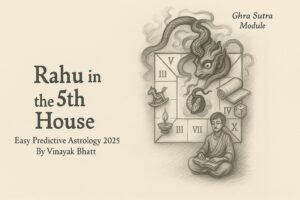
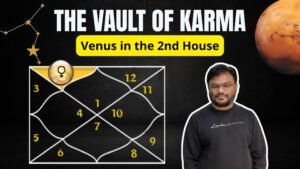
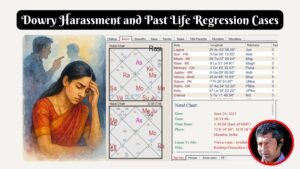


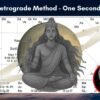


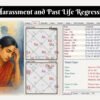
Leave a reply
You must be logged in to post a comment.